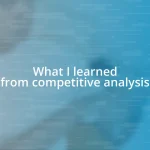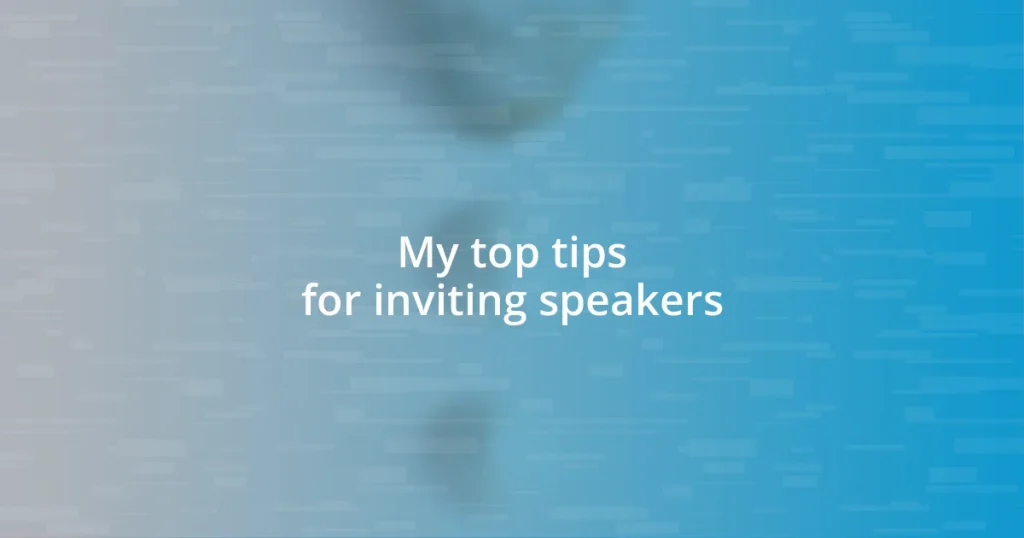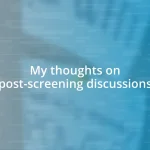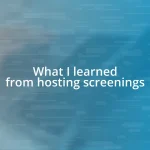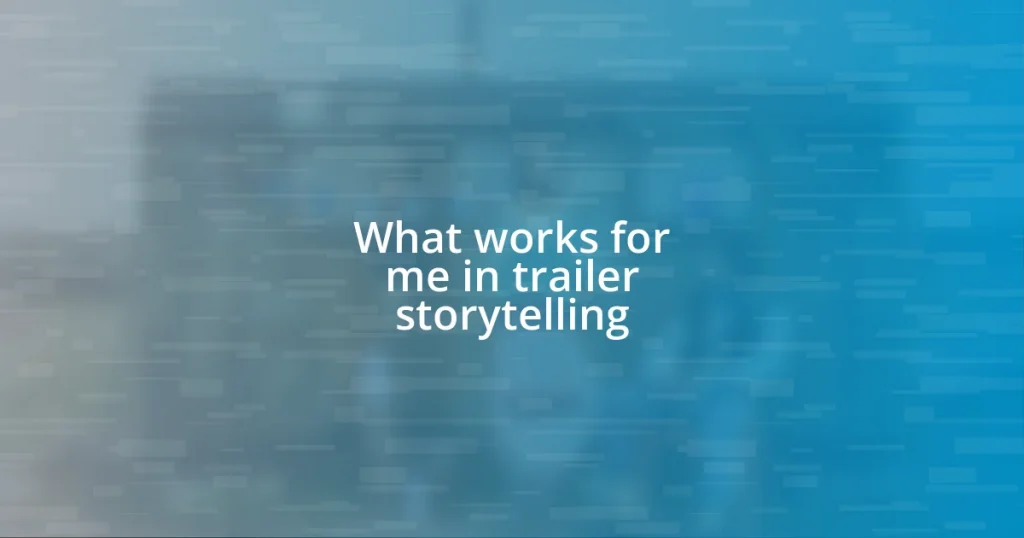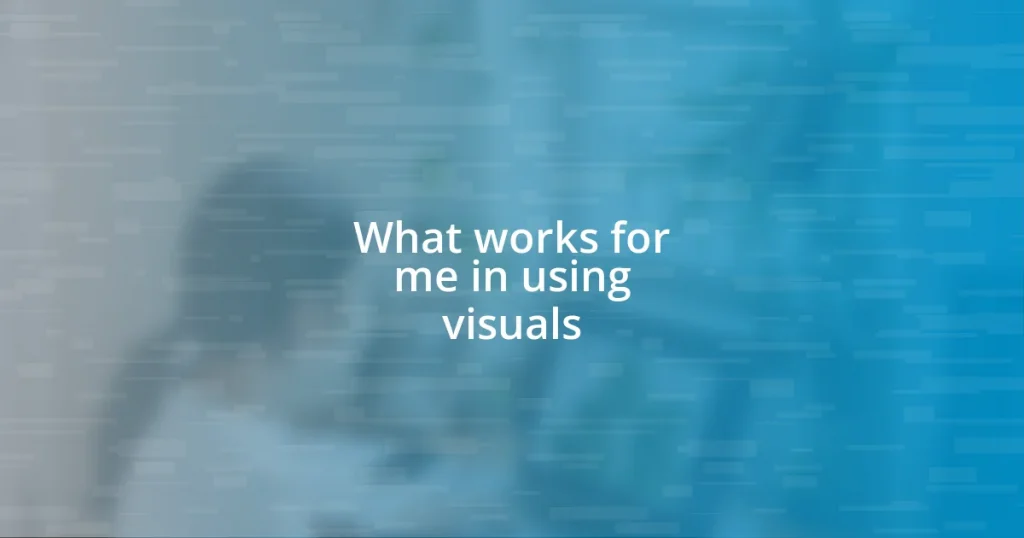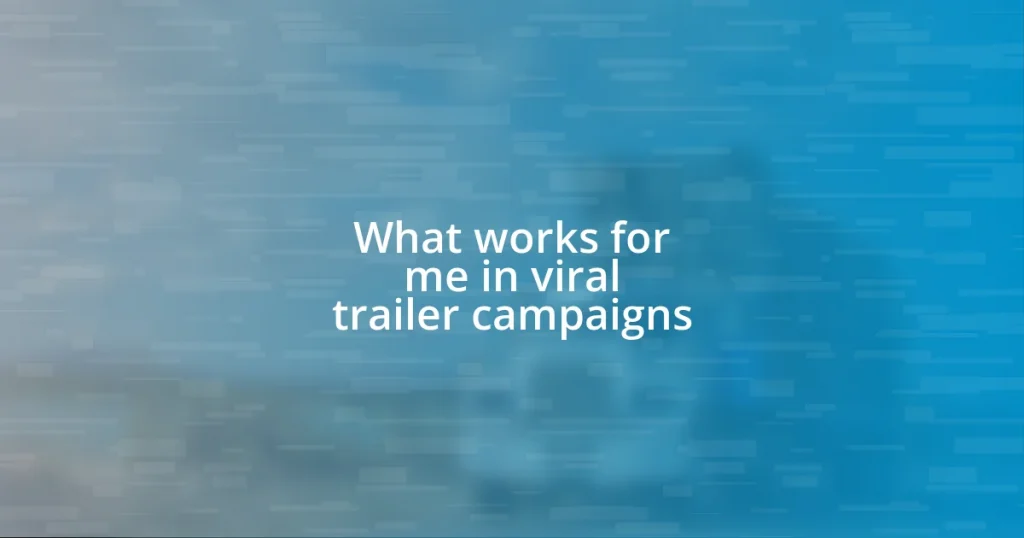Key takeaways:
- Choosing the right speaker involves aligning their expertise and delivery style with the audience’s interests and the event’s goals.
- Conduct thorough research on potential speakers through video presentations, reviews, and social media to gauge their effectiveness and engagement level.
- Post-event follow-up with speakers for gratitude and feedback strengthens relationships and enriches future collaborations.
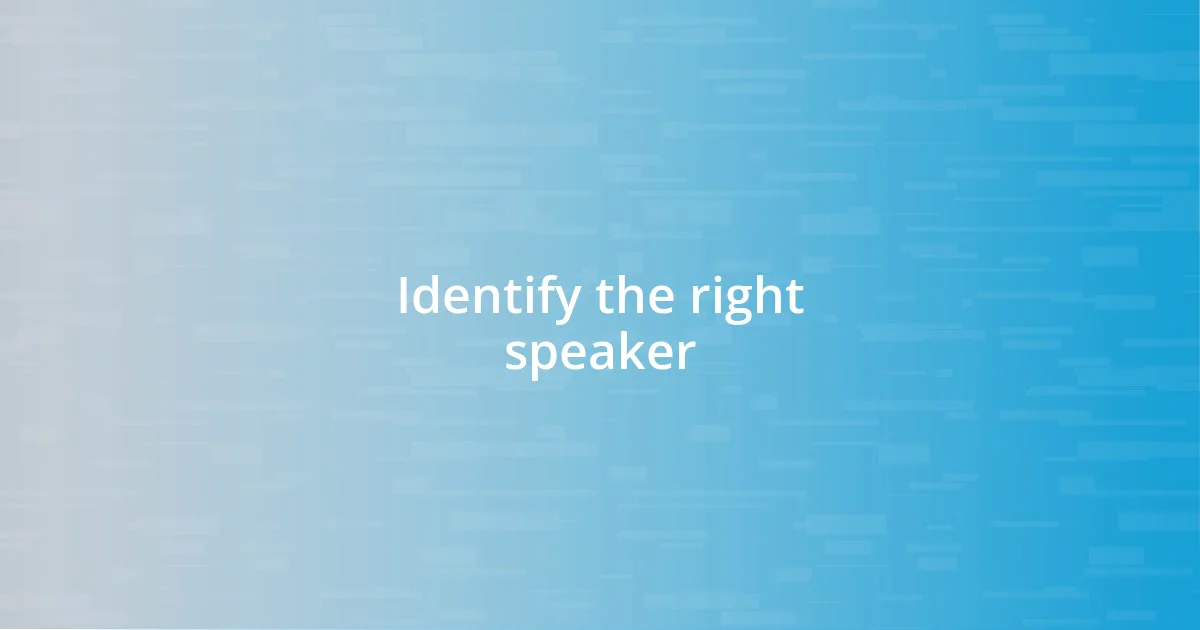
Identify the right speaker
When I think about identifying the right speaker, I remember a conference I organized where I faced the daunting task of choosing someone who truly connected with the audience. It struck me that the ideal speaker not only possesses expertise in their field but also resonates with the audience’s interests and values. Who wouldn’t want a speaker who not only informs but also inspires?
I’ve learned that digging into a potential speaker’s background and previous talks can reveal a lot about their speaking style and how they engage with their listeners. During one event, I discovered a speaker with a passion for storytelling, which transformed the entire atmosphere of the gathering. This really made me reflect—doesn’t the speaker’s delivery and relatability play a huge role in whether the audience finds value in their message?
Another crucial consideration is alignment with your event’s goals. I once invited a well-known industry expert who, despite their impressive credentials, missed the mark on our chosen theme. It was a tough lesson in understanding that having the right expertise isn’t enough if it doesn’t fit the context. So, how can we ensure that the speaker’s message aligns with our objectives? Taking the time to clarify your goals can guide your search and ultimately lead to a more cohesive and impactful event.
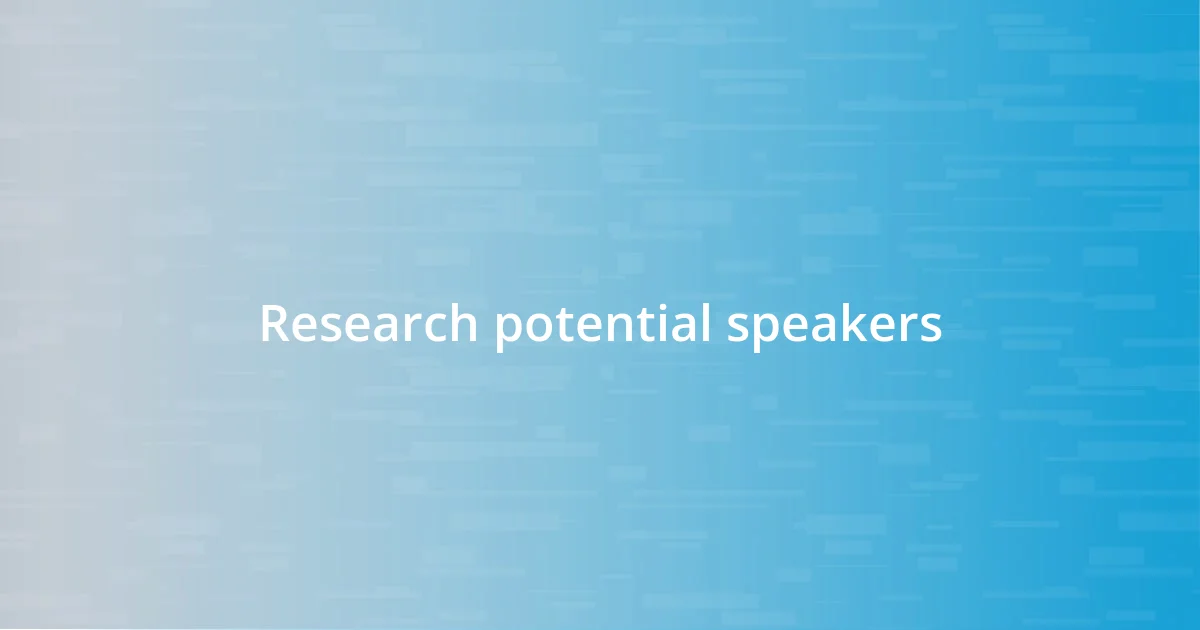
Research potential speakers
Researching potential speakers is an essential step that I often reflect on when organizing events. For example, I once spent hours browsing through speaker directories and watching videos of their past presentations. It became evident that some speakers had a way of capturing attention right from the start. I found that understanding their unique approaches and styles helped me gauge who would resonate with my audience. Have you ever watched a speaker who just lit up a room? That’s often a result of diligent research.
During this process, I also consider reading reviews or testimonials from people who have previously attended their talks. A few years back, I placed my trust in a speaker solely based on one glowing review. Unfortunately, the feedback turned out to be an outlier, as the speaker faltered during my event. It was a stark reminder that group sentiment is often a more reliable indicator than a single opinion. I always ask myself—does the collective feedback align with my event’s needs?
Finally, social media can be a treasure trove of information about potential speakers. I recall scrolling through Twitter and LinkedIn to gauge their engagement with followers and the kind of conversations they initiate. This not only reveals their expertise but also how they interact with diverse audiences. By observing how they handle questions or feedback, I can get a feel for their authenticity and approachability.
| Research Method | Benefits |
|---|---|
| Video Presentations | Assess speaking style and crowd engagement |
| Reviews & Testimonials | Gauge speaker effectiveness and audience reaction |
| Social Media Engagement | Understand speaker’s personality and interaction level |
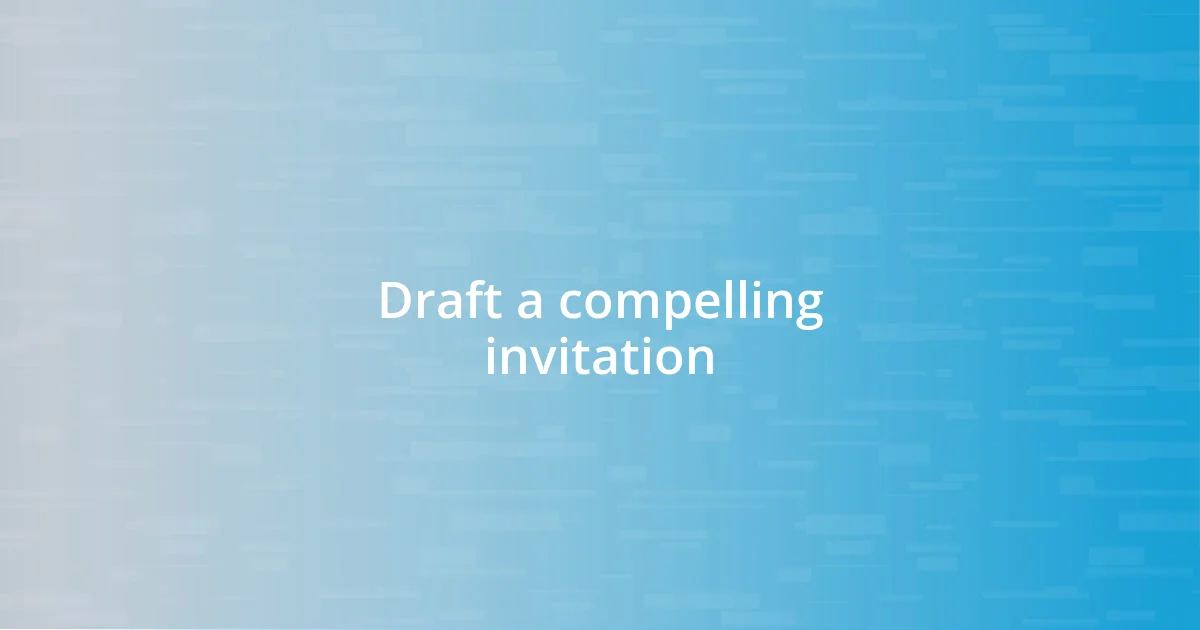
Draft a compelling invitation
Drafting a compelling invitation is a crucial step that I truly enjoy. I recall a time when I poured my heart into crafting an invitation for a highly sought-after speaker. It made all the difference. A well-structured invitation should not only outline the event details but also convey the excitement and value the speaker brings. I’ve found that personalizing the invite helps create an emotional connection right from the start.
Here are some quick tips for making your invitation compelling:
– Personal Touch: Address the speaker by name and mention specific reasons why you value their expertise.
– Clear Details: Clearly outline the event date, time, location, and audience expectations.
– Highlight Benefits: Explain how their participation can make a difference, not just to the audience, but to their personal brand or mission.
– Encourage Dialogue: Invite them to discuss their thoughts on the event’s theme; it fosters a sense of collaboration and engagement.
One experience I cherish involves inviting a speaker who had a significant influence on my career. I shared a personal story about how their work impacted me, which resonated with them. The moment they responded positively, I felt a sense of connection that underscored the importance of sincerity in invitations. This approach not only secured their commitment but also established a rapport that enriched our event.
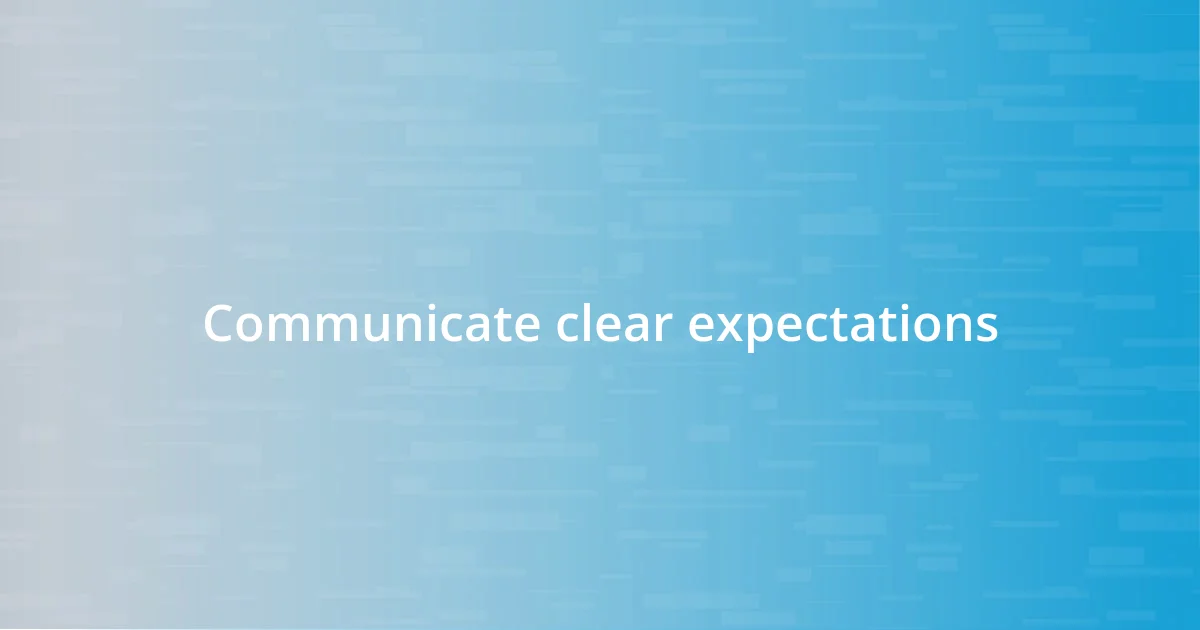
Communicate clear expectations
When inviting speakers, I’ve learned that communicating clear expectations is absolutely crucial. I remember one event where I assumed the speaker understood exactly what we were looking for, only to find out later that they had prepared material that didn’t quite align with our audience’s interests. Isn’t it frustrating when a lack of clarity leads to miscommunication? By providing detailed expectations upfront, including the topic focus, event format, and desired outcomes, I ensure everyone is on the same page from the start.
It’s not just about the event details; it’s about creating a shared vision. In my experience, I’ve found that laying out what success looks like for both the speaker and the event can be very motivating. For instance, during a webinar, I once shared specific metrics—like audience engagement goals and feedback forms—prior to the talk. This not only clarified what I expected but also encouraged the speaker to tailor their presentation to enhance those metrics. Have you ever felt that thrill when someone truly understands your vision? That’s what clear expectations can foster.
Lastly, I’ve discovered that having an open line of communication helps greatly. I’ll often check in with speakers before the event to discuss their thoughts or any adjustments they might want to make. This approach reminds me of a time when I collaborated with a panelist who had brilliant ideas that we could integrate together. Engaging in dialogue not only refined the presentation but also deepened our working relationship, which in turn created a richer experience for our audience. Isn’t it amazing how clarity and collaboration can transform an event?
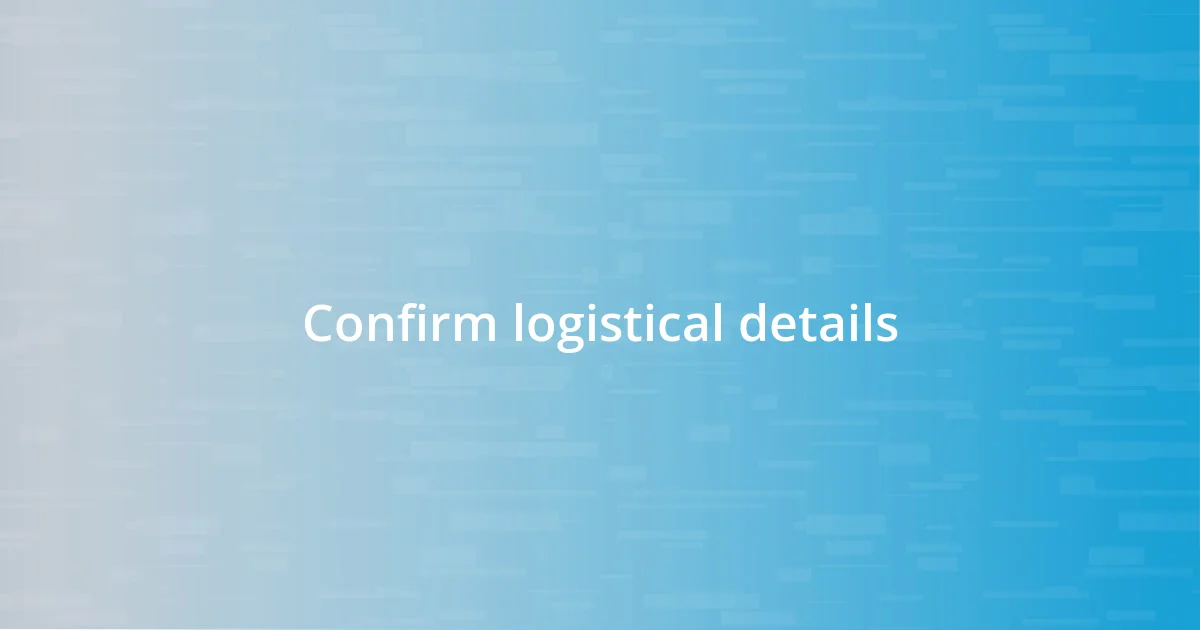
Confirm logistical details
When it comes to confirming logistical details, I can’t stress enough how vital it is to ensure everything aligns perfectly. One time, I was managing an event and overlooked confirming the audio-visual equipment with the venue. On the day of the event, we faced technical issues that could have been easily avoided. Isn’t it unsettling when small oversights trigger larger problems? I’ve learned my lesson: double-checking every detail can save you from unnecessary stress.
Timing is another critical aspect. I’ve found that setting a timeline for when you need the speaker to arrive, along with specific event schedules, prevents confusion on the day itself. At one of my events, I remember anxiously waiting for a speaker who arrived right before they were supposed to present. It added a chaotic feeling to what should have been an organized atmosphere. Has that ever happened to you? I learned that having clear arrival times and a structured schedule helps create a smooth-flowing experience for everyone involved.
Also, don’t forget about the essentials like transportation and accommodation if your speaker is traveling from afar. During another event, I took the initiative to arrange a smooth pick-up from the airport for a well-known speaker. Not only did it make them feel valued, but it also left a lasting impression. I remember their relieved smile when they saw someone waiting for them. It’s these thoughtful touches that foster positive relationships and create a welcoming environment. Have you ever considered how much a small gesture can enhance someone’s experience? I believe these details matter immensely.
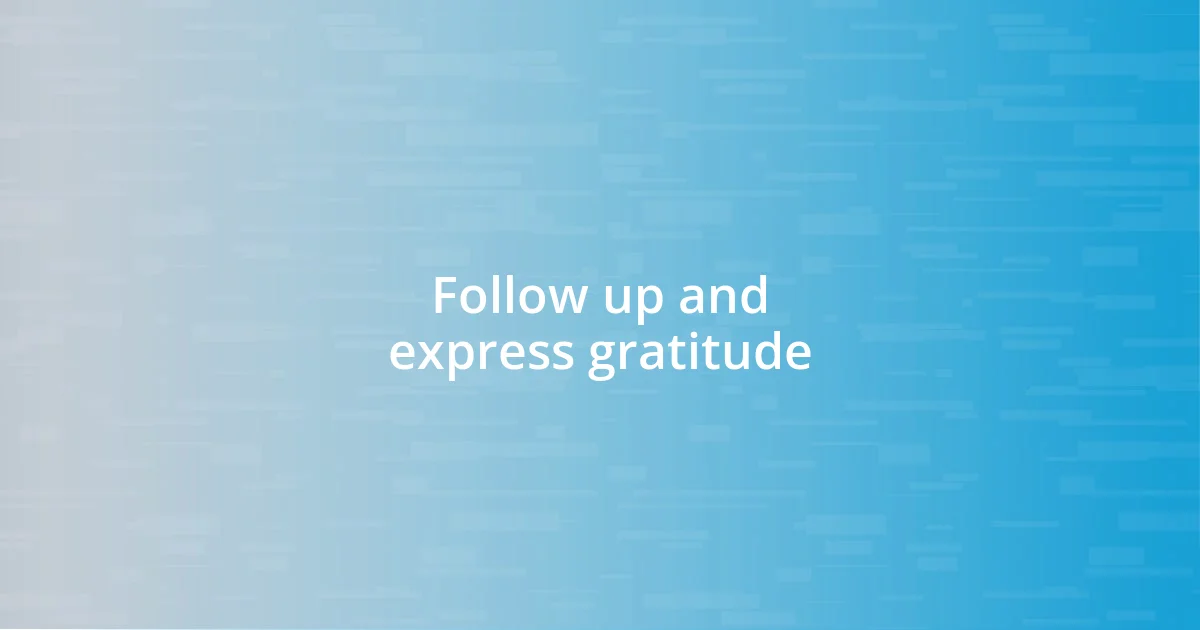
Follow up and express gratitude
After your event, following up with your speakers is not just courteous; it’s essential. I remember wrapping up a conference and sending a quick thank-you email to a panelist who had made a fantastic contribution. Their response was heartfelt, expressing how valued they felt. Isn’t it incredible how a simple acknowledgment can strengthen relationships and foster goodwill for future collaborations?
Expressing gratitude can also be a springboard for valuable feedback. I once reached out to a guest speaker a few days after an event to thank them and ask for their thoughts on the experience. They shared insights that were enlightening, and our conversation sparked fresh ideas for upcoming events. Have you ever considered how much you can learn from the people you invite? Taking that extra step to communicate can elevate your event planning and enrich your professional network.
Don’t underestimate the power of a handwritten note or a small token of appreciation. It’s personal, and it leaves a lasting impression. I once sent a small gift to a speaker who had gone above and beyond, and I was touched by their surprise and gratitude. Moments like that remind me how meaningful gestures can turn a professional relationship into a lasting friendship. Have you thought about how expressing sincere gratitude can create ripples in your professional life?
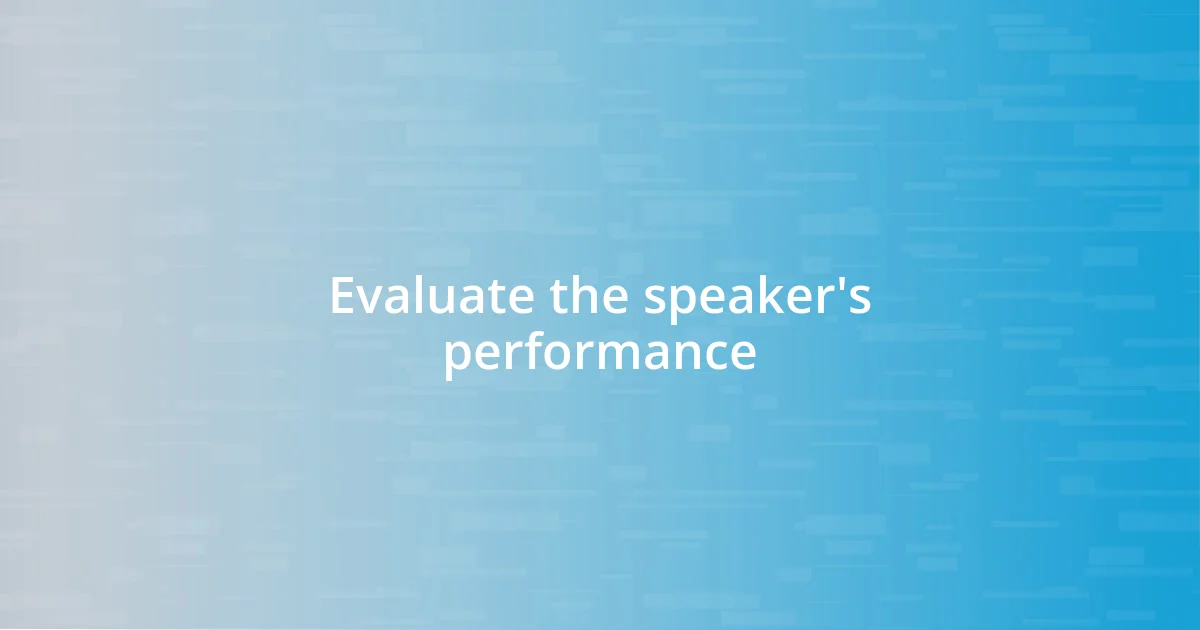
Evaluate the speaker’s performance
Evaluating a speaker’s performance is crucial for understanding the impact they had on your audience. After one of my events, I gathered feedback through short surveys and informal chats with attendees. Their insights were eye-opening — some mentioned how the speaker’s storytelling captivated them, while others felt a lack of engagement. It was a reminder of how different perspectives can shape our understanding of success. I often wonder, how do we truly measure a speaker’s effectiveness?
Looking at audience engagement during the session can also provide valuable clues. I recall attending a talk where the speaker encouraged questions, creating an interactive atmosphere. Those moments not only energized the crowd but also illustrated their ability to connect on a deeper level. Have you considered how audience reactions and participation can reveal a lot about the speaker’s influence?
Lastly, reviewing the speaker’s content delivery is vital. At one of my events, I noticed a speaker who spoke with genuine passion. Their enthusiasm was contagious, making even complex topics feel accessible. When you analyze how a speaker presents their material, you’re not just assessing their style — you’re also gauging how effectively they inspire and engage others. What do you think makes a presentation memorable? In my experience, it’s the combination of authenticity and connection that truly resonates.




